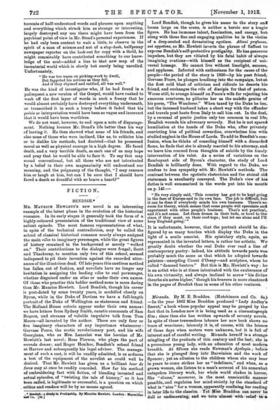FICTION.
BENDISH.*
Mn. MAXTRICE HEWLETT'S new novel is an interesting example of the latest phase in the evolution of the historical romance. In its early stages it generally took the form of a highly-coloured presentation of the traditional view of some salient episode. The most famous representatives of what, in spite of the technical contradiction, may be called the school of classical historical romance nearly always assigned the main roles to imaginary personages, while the great figures of history remained in the background or merely "walked on." Their contributions to the dialogue were frugal; Scott and Thackeray, to mention only two of this school, seemed indisposed to pit their invention against the recorded utter- ances of the illustrious dead. Of late years this cautious method has fallen out of fashion, and novelists have no longer any hesitation in assigning the leading roles to real personages, whether disguised under an alias or under their own names. Of those who practise this bolder method none is more daring than Mr. Maurice Hewlett. Lord Bendish, though his career is post-dated by some twenty years, is modelled closely on Byron, while in the Duke of Devizes we have a full-length portrait of the Duke of Wellington as statesman and friend. The Holland House coterie appear under their own names ; we have letters from Sydney Smith, caustic comments of Sam Rogers, and streams of voluble impulsive talk from Tom Moore—all invented by the author. There are only four or five imaginary characters of any importance whatsoever : Gervase Poore, the erotic revolutionary poet, and his wife Georgians., who as Mrs. Lancelot was the heroine of Mr. Hewlett's last novel; Rose Pierson, who plays the part of seconda donna ; and Roger Heniker, Bendish's school friend at Harrow and subsequently his legal adviser. The manage- ment of such a cast, it will be readily admitted, is as arduous a test of the equipment of the novelist as could well be desired. That Mr. Hewlett has given us a brilliant tour de force may at once be readily conceded. How far his method of embroidering fact with fiction, of blending invented and actual episodes, of "twisting the tale of history," as it has been called, is legitimate or successful, is a question on which _
critics and readers will be by no means agreed.
Benstiak.: a StudYin Prod:petit:v. By Maurice Hewlett. London; Macintlltui sad Co. [68.]
Lord Bendish, though he gives his name to the story and looms large on the scene, is neither a heroic nor a tragie figure. He has immense talent, fascination, and energy, but. along with these fine and engaging qualities he is the victim of a deep-seated and devastating egotism. Alieni profusus, sui appetens, so Mr. Hewlett inverts the phrase of Sallust to. express Bendish's self-protective prodigality. He has generous: impulses, but they are vitiated by his fatal habit of alway& imagining ovations—with himself as the recipient of uni-. versal homage. He cannot live without limelight, success,. and applause. Infected with enthusiasm for the cause of the people—the period of the story is 1830—by his poet friend,, Gervase Poore, he plunges headlong into the campaign, but at. the first cold blast of criticism and ridicule he deserts his.
friend, and exchanges the role of disciple for that of patron. Worse still, to avenge himself on Poore's wife for rejecting his.
amorous overtures, be pillories her as the malefic genius of his poem, "The Wanderer." When taxed by the Duke be lies, but the incensed husband takes a short way with the offender and travels post haste from Italy to call him out. In the duel,. by a reversal of poetic justice only too common in real life; Bendish wounds his adversary severely. But he is not spared humiliation at the hands of the Duke who, after privately convicting him of political cowardice, overwhelms him with, studied neglect in the House of Lords. To add to Bendish's con- fusion, when he thinks of consoling himself with a discardeti flame, he finds that she is already married to his attorney, and, we leave him rescued from thoughts of suicide by the timely intervention of his valet. As a series of variations on the flamboyant side of Byron's character, the study of Lord. Bendish is brilliantly done. With regard to the Duke, we confess to less sympathy with Mr. Hewlett's methods. The contrast between the egotistic rhetorician and the stoical old statesman is excellently conveyed. The Duke's view of hie, duties is well summarized in the words put into his mouth, on p. 145 :—
" He very simply said, 'This country has got to be kept going in the face of Europe and to its own face. The job is difficult, but it can be done if everybody minds his own business. There's no room for theory, which means that some people will speculate and experiment with other people's business. That's not practical,. and it's not sense. Let them dream in their beds, or howl to the if they must, on their roof-tops ; but let me alone and I'll keep England going.' " It is unfortunate, however, that the portrait should be dis- figured by so many touches which display the Duke in the light of a senile amorist. His epistolary style, again, as. represented in the invented letters, is rather too artistic. We. greatly doubt whether the real Duke ever read a line of contemporary poetry: indeed, his attitude towards poets was. probably much the same as that which he adopted towards. painters—excepting Count d'Orsay—and sculptors, whom he- called "damned busters." But this is Mr, Hewlett's way : he- is an artist who is at times intoxicated with the exuberance of his own virtuosity, and always inclined to screw "his divine theorbo six notes higher," though his bravura is more chastened in the pages of Bendish than in some of his other ventures.






























































 Previous page
Previous page